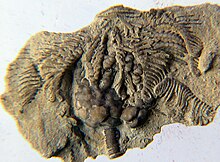| Camerata Temporal range:
| |
|---|---|

| |
| Rhodocrinus serpens, a sea lily of the family Rhodocrinidae, 16mm measured along the stem fragment and including cup and arms, collected at the Gilmore City Formation, near Gilmore City Iowa, USA, from the Lower Mississippian Carboniferous (Tournaisian) | |
| Scientific classification | |
| Kingdom: | |
| Phylum: | |
| Subphylum: | |
| Class: | |
| Subclass: | †Camerata |
| Subgroups | |
|
see text | |
The Camerata or camerate crinoids are an extinct subclass of Paleozoic stalked crinoids. They were some of the earliest crinoids to originate during the Early Ordovician, reached their maximum diversity during the Mississippian, and became extinct during the Permian–Triassic extinction event.[2] Camerates are the sister group of Pentacrinoidea, which contains all other crinoids (including living species). The two largest camerate subgroups are the orders Diplobathrida and Monobathrida.[3][4]

Anatomically, they are distinguished by:[5]
- fused junctions between the plates of the cup
- brachial plates incorporated into the cup
- tegmen forming a rigid roof over the mouth
- no less than ten and sometimes a very large number of free arms, often pinnulate
- ^ Revision of the Palaeocrinoidea...: Discussion of the classification and relations of the brachiate crinoids and conclusion of the generic descriptions. Partie 3 de Revision of the Palaeocrinoidea, Revision of the Palaeocrinoidea. Charles Wachsmuth and Frank Springer, Collins, printer, 1885
- ^ Bibliography and index of Paleozoic crinoids, coronates, and hemistreptocrinoids, 1758–1999. G. D. Webster. Geological Society of America Special Papers, vol. 363, 2003.
- ^ Cole, Selina R. (2017). "Phylogeny and morphologic evolution of the Ordovician Camerata (Class Crinoidea, Phylum Echinodermata)". Journal of Paleontology. 91 (4): 815–828. doi:10.1017/jpa.2016.137. ISSN 0022-3360. Archived from the original on 2023-11-10. Retrieved 2022-07-15.
- ^ Wright, David F.; Ausich, William I.; Cole, Selina R.; Peter, Mark E.; Rhenberg, Elizabeth C. (2017). "Phylogenetic taxonomy and classification of the Crinoidea (Echinodermata)". Journal of Paleontology. 91 (4): 829–846. doi:10.1017/jpa.2016.142. ISSN 0022-3360. Archived from the original on 2023-11-10. Retrieved 2022-07-15.
- ^ Treatise on Invertebrate Paleontology, Volume T. Echinodermata: Crinoidea. Ubaghs et al. Editors: R. C. Moore and C. Teichert. 1978.